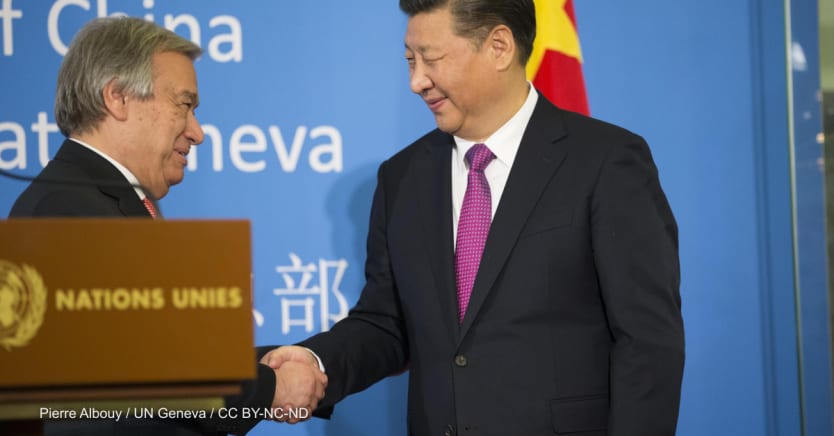
In a recent speech celebrating 100 years of the founding of the Chinese Communist Party, President Xi Jinping touched on China’s growing role in global development. China is promoting peace, “cooperation, and mutual benefits,” Xi said. While not everyone would agree with that characterization, China’s increased global activism is undisputed.
China has launched the largest infrastructure project in the world, the Belt and Road Initiative, endorsed by or directly involving 139 countries. Xi has spoken of China’s intention to “lead the reform of the global governance system.” The Atlantic Council recently detailed how China’s ability to influence other countries has soared during the past few decades, while America’s “outward influence capacity” has stayed flat.
Taken together with forecasts that project China’s economy to overtake the United States economy by 2028, it’s clear why China’s global influence has concerned American presidents and elected leaders in both parties for decades.
As a former Asia expert on Capitol Hill, who currently advocates for robust U.S. engagement at the United Nations, I have watched China assert itself at the global body, especially over the last five years. China’s enhanced presence at the U.N. serves as a useful lens to view its expanding role within global affairs.
Fortunately, the Biden administration has taken a series of key steps in the right direction but even more is required by the U.S. in the coming months around funding, personnel, and human rights.
President Joe Biden has called this moment a contest between autocratic governments and democracies, determining which system is best suited to meet the demands of the 21st century.
—On funding matters, China is now the second biggest contributor to the U.N.’s regular budget, following the U.S. Its payment of more than $347 million for 2021 is all the more remarkable when compared to its $12 million contribution in 2000. Recent analysis has shown that China’s shares of U.N. budgets will match those of the U.S. in six to eight years, which will further alter the underlying dynamics behind contributions and influence.
China is also the second biggest contributor to the U.N. peacekeeping budget and deploys more peacekeepers than the four remaining permanent members of the Security Council — the U.S., the United Kingdom, France, and Russia — combined. In 2016, China promised the U.N. peacekeeping an additional $1 billion dollars to be paid over 10 years.
The Biden administration’s budget proposal, recently endorsed by the House Appropriations Committee, is the right first step in restoring America’s global leadership and countering China’s growing financial influence at the U.N. The bill increases international affairs spending 12%, fully funding U.N. treaty commitments and providing lifesaving assistance to humanitarian agencies.
Going further, if all U.N. peacekeeping arrears are paid off in two years, as the administration recommended, and the arbitrary legislative cap on peacekeeping contributions is repealed by Congress, U.S. credibility would be largely restored in the global body. And China could no longer deride the U.S. as “the world’s largest debtor.”
It’s not just on funding matters that China is stepping up at an alarming rate within the U.N. system. Chinese nationals now head 4 out of 15 U.N. specialized agencies: the International Telecommunications Union, the International Civil Aviation Organization, Food and Agriculture Organization, and the Industrial Development Organization.
U.N. agencies are largely responsible for setting international norms and standards. In its annual report to Congress, the U.S.-China Economic and Security Review Commission said that dominating technical standards is integral to China’s ambitions.
To counter this, the Biden administration must return to the head of the table at the U.N. In addition to paying U.S. dues and arrears, this means rebuilding the State Department and “investing in and re-empowering the finest diplomatic corps in the world.” During her confirmation hearing to become assistant secretary of state, Ambassador Michele Sison said that the State Department will focus on getting U.S. representatives into top U.N. positions, as well as investing in the U.N.’s junior professional officer programs.
Such initiatives are needed, since there will be 15 elections for the heads of U.N. specialized agencies, and five for major U.N. funds and programs, in the coming 18 months. Mobilizing allies will be essential in each of these elections.
Lastly, China has become considerably more active in the global human rights system. In the past four years, in the context of U.S. budget cuts, Chinese diplomats sought to reduce funding for human rights monitoring and civilian protection posts in U.N. peacekeeping missions. In 2018, China and Russia successfully lobbied a range of other countries to cut the Human Rights Upfront initiative — with no pushback from the Trump administration.
While as many as one million Uyghurs remain imprisoned in Xinjiang, China continues to block the office of the U.N. Human Rights from establishing a presence in the country.
In response, the U.S. must continue to lead and engage with all U.N. bodies — including the UN Human Rights Council — even when engaging is controversial. The U.N. Human Rights Council, for example, has been rightly criticized for the inclusion of countries with troubling human rights records, and for bias against Israel.
That being said, at a recent congressional hearing, U.N. Ambassador Linda Thomas-Greenfield rightly explained that the U.S. presence on the council allows our country to advance key human rights principles, assist allies, and advocate for reform, points substantiated by a range of human rights organizations.
While China’s U.N. actions over the past four years have not amounted to a takeover, they are not random, either, and link with a larger and “well-considered Chinese grand strategy.”
President Joe Biden has called this moment a contest between autocratic governments and democracies, determining which system is best suited to meet the demands of the 21st century. China has executed its world view with renewed vigor. Now it’s time for the U.S. to do the same, leading with an articulation of the values of freedom, justice, and peace that captured the world’s imagination when the U.N. was formed more than 75 years ago.








